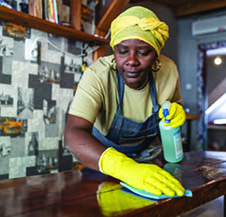In November 2020, the Constitutional Court extended the inclusion of domestic workers into the Compensation Fund and the new rules took effect in 2021.
This means that domestic workers are now eligible for work-related injury, illness and death compensation.
“The Compensation Fund is there to assist workers if they are injured, contract a disease or die on duty. Domestic workers or their dependents can claim from the Compensation Fund,” says Compensation Fund Director for Communication and Stakeholder Management Hlonitshwa Mpaka.
There are only 1676 domestic employers registered with the Compensation Fund.
She added that it is the employer’s responsibility to register a domestic worker with the Compensation Fund and the Unemployment Insurance Fund (UIF).
They can do this through the Department of Employment and Labour’s website (www.labour.gov.za.) 
Domestic workers are required to be registered with the Compensation Fund, regardless of their working hours.
The amount the employer must contribute on behalf of their domestic worker is determined by the domestic worker’s yearly earnings.
If an employee is injured on duty, the employer must provide the necessary documentation for a claim to be processed, including the employee’s identity document and a medical certificate, which must contain detailed information about the injury and damages.
Claims can be done online via the CompEasy system (compeasy.labour.gov.za).
If you need more information about registering with the Compensation Fund, you can get in touch with them through their call centre on 0860 105 350 or you can visit a labour centre around the country.
Registering with the UIF
UIF Director of Communications and Marketing Makhosonke Buthelezi also encourages domestic workers and employers to register with the UIF, which gives short-term relief to workers when they become unemployed or are unable to work because of maternity, adoption and parental leave, or illness.
“As a domestic worker, you must be working for more than 24 hours per month to be registered. You do not qualify for UIF if you work less than that. If you work for more than one employer, they should register you with the UIF, provided you work for 24 hours per month for each of them.”
Buthelezi adds that both the employer and the employee should contribute to the UIF. The amount is determined by the employee’s monthly earnings. The employer and employee contribute one percent each to the UIF on a monthly basis.
“There are currently 724 801 domestic employers registered with the UIF,” says Buthelezi.
The minimum wage for a domestic worker increased with effect from 1 March 2022, from R21.69 to R23.19 an hour.
“The Compensation Fund is there to assist workers if they are injured, contract a disease or die on duty.”
How to register with the UIF
An employer will need to complete the UI.8D and UI.19 application forms. Completed forms can be sent via post to PO Box 1851, Pretoria, 0001; emailed to Newui8registrations@labour.gov.za; or submitted at the nearest labour centre.
These forms can be obtained from the Department of Employment and Labour’s website (www.labour.gov.za).
An employer may also do the registration online at www.ufiling.gov.za.
They will need the following documents:
- A completed application form or complete an application form online
- South African identity document or smart card
- A passport in the absence of an identity document
- An asylum seeker permit.
An employee can claim UIF benefits at their nearest labour centre or online at www.ufiling.co.za/uif/.
If you would like more information on the UIF and how to claim, you can visit your nearest labour centre or visit the Employment and Labour website.
You can also go to the department’s social media pages, Facebook (UIFZA) or Twitter (@UIFBenefits).
Did you know?
May is Workers’ Month, which serves as a celebration and reminder of workers’ rights.



 Facebook
Facebook Twitter
Twitter WhatsApp
WhatsApp